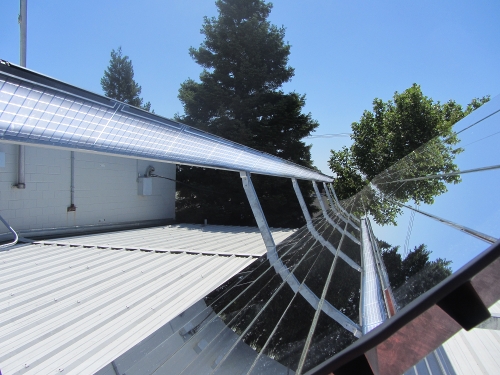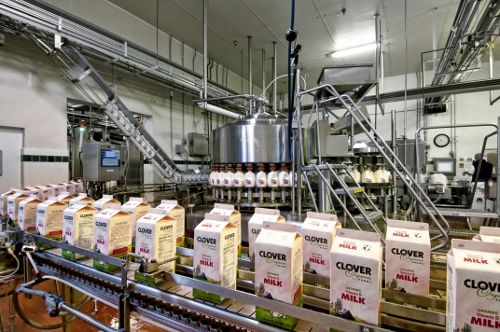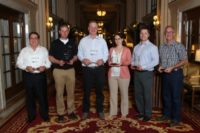A California dairy processor has installed a hybrid solar-powered co-generation system that heats water and generates electricity.
Clover Stornetta Farms, Petaluma, Calif., was looking for a renewable energy source that would not only offset its electricity usage but also its natural gas consumption during the wastewater treatment process at its processing plant in Petaluma.
Clover Stornetta selected a solar cogeneration solution from Cogenra that delivers hot water and renewable electricity with a payback period of less than five years. This hybrid technology combines photovoltaic (PV) and solar hot water (SHW) generation in one product.
The dual energy generation uses more of the sun’s energy (75% with solar cogeneration versus 15% and 60% with PV and SHW, respectively) and provides customers with more energy, better environmental benefits and faster paybacks.
 Cogenra Solar collaborated with One Sun Inc., a local expert in solar PV and solar thermal installations, to construct Clover Stornetta’s 20-module system on the roof of the dairy plant. The 50.6 kilowatt system, constructed in just a few weeks and taking up less than 1,500 square feet of roof space, integrated seamlessly with Clover Stornetta’s existing natural gas water heaters and electrical equipment.
Cogenra Solar collaborated with One Sun Inc., a local expert in solar PV and solar thermal installations, to construct Clover Stornetta’s 20-module system on the roof of the dairy plant. The 50.6 kilowatt system, constructed in just a few weeks and taking up less than 1,500 square feet of roof space, integrated seamlessly with Clover Stornetta’s existing natural gas water heaters and electrical equipment.
The solar cogeneration array pre-heats water to 145 F for Clover Stornetta’s steam-fed CIP process. During the CIP process, wastewater is pumped continuously through three wastewater filters, which are periodically backflushed with cold and hot water. The Cogenra system pre-heats the water, which is then injected with steam in order to reach the required CIP temperature.
The system was assembled on site and includes fully integrated hydronics, controls and inverters, enabling a plug-and-play, turnkey solution. In addition, remote monitoring and diagnostics provide Clover Stornetta with insight into the system’s real-time performance.
Financial and environmental benefits
Cogenra’s solar cogeneration installation provides Clover Stornetta with financial and environmental improvements for its Petaluma dairy plant, helping reduce not only energy costs but also greenhouse gas emissions.
The system will offset about 15% of the plant’s energy usage, displacing approximately 11,500 kilowatt hours and 2,300 therms annually. This translates into more than 50% savings on energy used for the wastewater heating process. The installation will also reduce Petaluma plant’s greenhouse emissions by 32 metric tons each year, equivalent to removing 3,500 gallons of gasoline and saving 800 trees annually.
 Dairy production requires a large amount of hot water and Clover Stornetta uses over 6,000 gallons each day for its clean-in-place (CIP) processes. Solar cogeneration helps dairy plants achieve industry environmental goals better than other solar systems, providing greater GHG emission reductions: almost 3 times more than photovoltaics and almost twice than solar hot water systems.
Dairy production requires a large amount of hot water and Clover Stornetta uses over 6,000 gallons each day for its clean-in-place (CIP) processes. Solar cogeneration helps dairy plants achieve industry environmental goals better than other solar systems, providing greater GHG emission reductions: almost 3 times more than photovoltaics and almost twice than solar hot water systems.
Clover Stornetta Farms is a family-owned and operated dairy processor and one of California’s leading dairy companies, distributing a wide array of dairy products throughout California, Arizona and Nevada.
The processor is considered a pioneer in the dairy industry, defining best practices for sustainability. Clover Stornetta has already employed a waste water treatment system which reduces its water consumption by 10 million gallons per year, but sought ways in which it could further its sustainability efforts, reducing energy costs and greenhouse gas emissions.
Clover Stornetta is one of only 13 companies worldwide to be recognized with the Seal of Sustainability, which shows the company’s leadership in the acceptance and adaptation of sustainable economic, social, and environmental business practices.
This article is based on information provided by Cogenra.







